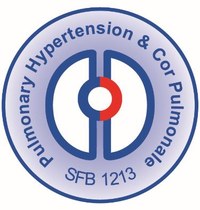SFB 1213 seminar series - Guest speaker Prof. Dörthe Katschinski: "Oxygen sensing in the cardiovascular system"
Seminar series of the Collaborative Research Center "Pulmonary Hypertension and Cor Pulmonale" - guest lecture by Dörthe Katschinski, Director of the Department of Cardiovascular Physiology, University Medical Center Göttingen
- https://www.uni-giessen.de/de/ueber-uns/veranstaltungen/seminar/seminarsfb1213katschinski
- SFB 1213 seminar series - Guest speaker Prof. Dörthe Katschinski: "Oxygen sensing in the cardiovascular system"
- 2018-09-25T17:00:00+02:00
- 2018-09-25T18:00:00+02:00
- Seminar series of the Collaborative Research Center "Pulmonary Hypertension and Cor Pulmonale" - guest lecture by Dörthe Katschinski, Director of the Department of Cardiovascular Physiology, University Medical Center Göttingen
25.09.2018 von 17:00 bis 18:00 (Europe/Berlin / UTC200)
Biomedical Research Center Seltersberg, Schubertstr. 81, 35392 Giessen, small lecture hall, ground floor
Members of the SFB 1213 and everybody who is interested
In her guest lecture, Professor Katschinski will talk about her current research.
An overview of her work:
Cellular adaptation to hypoxia:
High altitude and various cardiovascular diseases have a limited oxygen supply in common. The molecular mechanisms of hypoxia sensing and its therapeutic consequences are investigated in the Department of Cardiovascular Physiology.
Oxygen-Sensing:
Cellular adaptation towards a decreased oxygen supply is facilitated by stabilization and activation of the hypoxia-inducible transcription factor (HIF). Prolyl-4-hydroxylase domain (PHD) enzymes hydroxylate the alpha-subunit of HIF at two critical prolyl residues (P402 and P564). The enzymatic reaction is directly depending on the oxygen substrate concentration. HIF-hydroxylation leads to a pVHL-mediated ubiquitination and rapid proteasomal degradation of HIF alpha. In hypoxia the HIF hydroxylation is impaired, which results in HIF-1 alpha stabilization as well as subsequent heterodimerization with HIF alpha, nuclear translocation, recruitment of transcriptional co-factors and finally transcriptional activation of oxygen-dependent gene expression. HIF target genes are involved in erythropoiesis, glycolysis, angiogenesis etc. to support cellular homeostasis in hypoxia. PHD enzymes are candidate molecules for modulating the cellular adaptation towards hypoxia. One goal of their projects is to characterize the PHD enzymes regarding their organ and isoform-specific function, putative co-factors as well as consequences of inhibition of the PHD enzymatic activity.
Heart-specific HIF target genes:
Most of the HIF target genes are ubiquitously expressed. However, there are cell type/tissue-specific target genes. This facilitates the organ-specific adaptation towards hypoxia. To gain a better understanding for the hypoxia-adaptation of cardiomyocytes, cardiac-specific HIF target genes and their impact for the hypoxic response are investigated.
Impact of hypoxia-inducible gene expression for the adaptation to mechanical load:
Mechanical load results in cardiac hypertrophy. In case of pathophysiological hypertrophy the cardiac angiogenesis does not keep up with the increased muscle mass resulting in decreased blood supply. In case of physiological hypertrophy – as a consequence of for example endurance exercise – cardiac angiogenesis and cardiac muscle mass are balanced. The signalling pathways responsible for this difference are largely unknown, although they might be potential targets for developing pharmacotherapy against cardiac insufficiency. The goal of the project is to analyze the role of hypoxia-inducible gene expression for the angiogenesis in the hypertrophied heart. PHD2 and PHD3 will be in the focus of the study. To this end, genetically modified mouse models (cardiac-specific PHD2, PHD3 and PHD2/3 knock out mice) undergo transverse aortic banding (TAC).
Cardioprotective function of the cellular oxygen sensors Prolyl-4-hydroxylase domain (PHD) 2 and 3 in myocardial ischemia:
Goal of the project is to analyze, if the cellular oxygen sensors PHD can facilitate cardiac protection in case of ischemia. Myocardial infarction is one major cause of death in industrial nations with an incidence of 300 infarctions per 100,000 inhabitants and year. Acute myocardial infarction is the second most common cause of death in Germany. Cardiac tissue protection in case of acute ischemia could result in better short and long term survival of the patients. To this end genetically modified mice (cardiac specific PHD knock out and transgenic mice) are analyzed in a myocardial infarction model.
Source: http://www.herzzentrum-goettingen.de/en/content/research/138.html
Everybody who is interested is very welcome to join our seminar series.
The seminar dates are published at https://www.uni-giessen.de/fbz/fb11/forschung/schwerpunkte/sfb/SFB1213/events.
